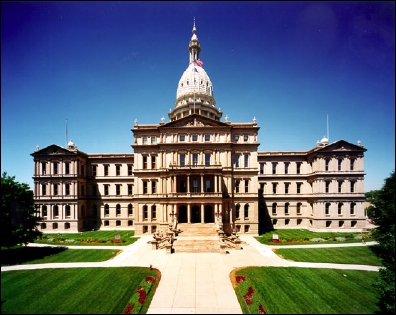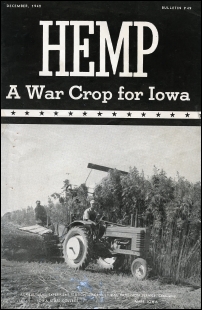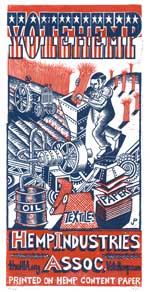SOURCE:
California will vote in a few weeks on Proposition 19, which would (if it passes) effectively legalize the recreational use of marijuana in the state. Chances of it passing seem to be growing, if you'll excuse the metaphor, like a weed. Right now, the poll numbers for Proposition 19 are better than the numbers for Democratic gubernatorial candidate Jerry Brown or Democratic Senator Barbara Boxer against their respective Republican opponents, for instance. Meaning California could become a "test-case" state in challenging federal laws on the matter. But what would this mean, practically? Well, a lot of it hinges on how President Barack Obama reacts. Which is impossible to say right now, but at least we can examine the possibilities, now that California legalizing marijuana seems to have moved from the "pipe dream" category (sorry about that, I couldn't resist) to a very real political possibility, if the polling trend continues.
The polling on Proposition 19 still does fluctuate, but appears to be getting better on average. Eight of the last nine polls have shown Yes on Prop. 19 with a 4-11 point lead (average lead: 7.1 percent). The best of these is less than a week old and showed a 52-41 split. In four of these, Yes on Prop. 19 scored at 50 percent or better. Now, this doesn't mean passage is a sure thing at this point. Seasoned supporters of state propositions don't really begin to breathe easily until the polling for the proposition hits 55 percent or better (which is usually seen as pretty much unbeatable). The highest poll yet in favor of Prop. 19 has been 53 percent, in comparison. And, although probably an aberration, the most recent poll showed a stunningly different story, with Prop. 19 losing 43-53. Measuring it against the other polling, though, this latest poll is likely an outlier. Polling on the proposition is in itself questionable, for the simple reason that after 100 years of the "Drug War," most citizens may have problems answering questions about drugs honestly when an absolute stranger calls them up and asks them. But, overall, the polling is much better than it was even a few months ago, and the movement seems to be towards the Yes side. The battle's far from won, but it is looking more and more winnable, to put it another way.
If California does go ahead and legalize marijuana, the entire Proposition 19 campaign could bear some very interesting offspring as soon as 2012. Even the staid Wall Street Journal just pointed out the fact that a whole bunch of Democratic strategists are watching this race very, very closely. This is because it could become a dandy "hot button" issue on the Left, in much the same way that banning gay marriage has been a successful political tool on the Right. These hot buttons on both sides energize the base of the party and increase voter turnout among some normally-apathetic groups. The way this thinking goes is: California's youth may surprise everyone and buck the general trend for any midterm election (where young voters mostly skip voting), and vote in droves precisely because a pet issue of theirs is on the ballot. This means it may behoove Democrats to put marijuana legalization initiatives on state ballots in order to drive up turnout in 2012, and beyond. Democratic politicians, however, are going to be a lot more reluctant to join this bandwagon, but one assumes they'll certainly be thankful for the benefits of a bigger Democratic turnout. Both Jerry Brown and Barbara Boxer are officially against Proposition 19, but I bet in private they're thanking their lucky stars that it made the ballot this year.
"Yes on 19" spokesman Tom Angell, when contacted about this possibility, was optimistic about the prospect of Democrats having a change of heart politically, if Proposition 19 wins in November: "The pervasive political thought among Democrats is that supporting marijuana reform is politically dangerous -- but eventually they'll realize that supporting such reform means that they won't be punished at the polls as a result, but that they may in fact be rewarded." Angell is currently "on loan" to the Yes on 19 group, and is normally Media Director for a group which has endorsed Proposition 19, "Law Enforcement Against Prohibition" (or L.E.A.P.), which is made up of current and former police officers, judges, and others from the law enforcement field.
Turning back to my main point, though, let's just assume for the sake of argument that Proposition 19 passes on Election Day California (which, for those of you on the East Coast, will happen three hours later than you expect it to... ). Glassfuls of bubbles will be raised across the state in victory salutes; although these won't be the traditional Dom Pérignon champagne served in Waterford flutes, but rather glass bongs bubbling merrily away. Marijuana legalization is approved by the voters 54-46, and everyone lives happily ever after, right?
Well, no. Marijuana is still quite illegal under federal law. And federal law always trumps state law. At least, unless the United States Supreme Court rules against the federal law or Congress decides to change it. So what would the passage of Proposition 19 actually mean for Californians?
It depends. It all depends on President Barack Obama, at least for now. Because Obama has a number of choices open to him as to how the federal government is going to react to this development. And it's impossible to say exactly what form this reaction would take. But we can at least outline the possibilities at this point. From worst to best, here's how I see these possible options:
Crackdown / escalate
Obama could instruct his Justice Department to crack down unmercifully. This includes both the "law" and "order" parts of the Justice Department, to borrow a television metaphor. Federal agents (such as, but not limited to, the D.E.A. and the F.B.I., just for starters) could be mobilized, and the feds could start busting everyone in sight for blatantly violating the federal Controlled Substances Act (with a Schedule I narcotic, no less), and the federal prosecutors could start jamming these cases through with a passion.
Remember, even though President Obama admits he smoked a little weed in his own day, he has been consistently against any and all hints of legalization. In fact, it was one of the first Lefty issues he not only dismissed, but actually ridiculed (Obama was forced to address the issue because it wildly outpolled all other questions for his first "online town hall" meeting, very early in his term, and he turned the whole thing into a joke).
This is probably pretty far-fetched, though, I have to admit. Such an overreaction would require an immense amount of manpower and court time and likely wind up being pretty futile in the end. But you never know. This could also be an option later on, after Obama leaves office, but we'll get to that in a bit.
Make some examples
The second route the Obama administration could take is to "make an example" of a few people. Crack the whip on some high-profile arrests and court cases, but leave the low-level stuff alone. This could go a number of different directions, depending on which scapegoats the feds choose to go after. The Obama team has, for instance, said that they will not target medical marijuana shops that "are legal under state law" but will continue to bust those that fall afoul of the law (mostly by not checking the paperwork of who they sell to). Which they indeed have continued to do.
But that kind of all goes out the window if it's legal for everyone. Assumably, the Obama people would refrain from sending in thousands of new D.E.A. agents to the state, but also go after some big-time busts, just to make a legal point. Which leads us to the next option.
Fight it out in the courts
Whether the Obama folks use a test case via a big bust, or they just sue the state directly, this battle may get fought out in the court system. Which doesn't exactly bode well for Proposition 19, for the exact same reason Obama is suing Arizona over their recent immigration law -- federal law always trumps state law. Unless California can convince the Supremes that there is a constitutional right to smoke pot, which should be seen as somewhat of a longshot, at least in the legal realm.
Blackmail the state
This one may come from Congress, but it may also get Obama's support (again, Obama himself is on record as being against legalization). Congress could cut off a whole bunch of money for the state of California. This would not be limited to "funds to fight the Drug War," most likely. There are all sorts of things in the federal budget that could be used to make California pay a serious price for legalizing marijuana. This sort of congressional "blackmail" happens all the time, I should point out, and was the mechanism used in the 1980s (with highway funding) to force all the states to raise their drinking age to 21. Again, though, this would likely come from Congress itself, rather than the White House.
Do nothing
There's a long history of standing back and letting states be the "laboratories of democracy" in situations like this, which Obama could indeed take. Call it the laissez-faire option. Or, if you prefer non-French terminology, call it the free-market option.
This option would consist of sitting back, and then waiting to see what happens. Obama could tell the Justice Department to only enforce the federal marijuana laws in 49 states, since California has shown it wants to try something new. There is lots of precedent for doing so, most notably up in Oregon, where they have an assisted-suicide law. This law was passed by Oregon residents, and at first the feds were very heavy-handed and threatened doctors with the loss of their D.E.A. approval to write prescriptions, but has since calmed down (since Obama took office, at least) into the feds "looking the other way." Civilization in Oregon has not noticeably collapsed in the meantime.
This would be the thing Californians are likely to hope for from Obama. If Obama came out and gave a speech on "the will of the voters" and that sort of thing, and then announced a new "hands off CA" policy, then we would have a little laboratory-of-democracy experiment, which could be very instructive to the rest of the country. I have no idea what the chances of this outcome happening are, though, I freely admit.
Jump on the bandwagon
And I have to put this last one as just as unlikely as the first one. President Obama could see the error of his ways, not only announce his "hands off CA" federal policy, but also become an advocate for full legalization of marijuana nationwide.
As I said, I really don't expect or even hope for this to happen, because it seems so far-fetched, but I mention it here for completeness' sake.
CONTINUE READING:

 Chicago boasts some of the
Chicago boasts some of the
























